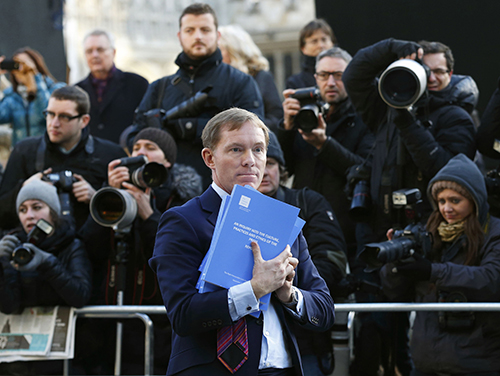British journalists say the future of independent and investigative journalism in the U.K. is at stake, as a deadline for public consultation on press regulation ends tomorrow. If it is implemented, Section 40 of the Crime and Courts Act 2013 would leave news outlets not signed up to an official press regulator liable for the legal costs of both sides in any libel or privacy court case–even if the outlet won.
The British press is campaigning hard against the proposal, which Bob Satchwell, executive director of the Society of Editors, told CPJ “would have a dramatic, chilling effect on newspaper reporting and investigation.”
Katherine O’Donnell, night editor of the Scottish edition of the U.K. paper, The Times told CPJ that the act would diminish the ability of the press to hold power to account. “Giving politicians any say in how journalists are regulated has, for many obvious reasons, always been a frightfully bad idea,” she said. “The checks and balances of today’s government can and will be eroded and undone by future, less benign administrations. We would be fools to open that door.”
Section 40 came about as a result of the Leveson Inquiry into allegations that British journalists had hacked the phones of celebrities and others to glean information. The previous independent regulator, the Press Complaints Commission, was disbanded after Lord Justice Leveson recommended that a new regulator be formed. Rather than create a statutory body, authorities opted to utilize an arcane mechanism known as a Royal Charter to set up a panel to approve applications for a new regulator, but this decision was made without the input of media representatives, according to media analysis blog SubScribe.
The industry set up a new regulator of its own–the Independent Press Standards Organisation (IPSO)–to which most leading outlets signed up, but it has not applied for recognition by the Royal Charter.
So far, only one regulator, the Independent Monitor for the Press (Impress) has applied and been approved under the charter. No major outlet has signed up since it was approved in October. Part of the British media’s concerns over the regulator is that it is funded in part by a £3.8 million (US$4.6 million) donation from Max Mosley, the former head of Formula 1 racing. Mosley successfully sued the News of the World for invasion of privacy after it published footage of him having sadomasochistic sex with prostitutes, according to news reports.
“Papers don’t want to be governed by a state-approved regulator, and certainly not by one financed and staffed by people they see as hostile to the press,” Liz Gerard, a former senior editor at The Times, who writes SubScribe, told CPJ.
O’Donnell said: “[The act] has the potential, if fully enacted, to place extraordinary power to bully and bankrupt publishers into the hands of the very people who should fear journalists the most–the corrupt, criminal, and the powerful.”
Satchwell noted that the regulator is the only recommendation to emerge from the Leveson Inquiry that was rejected by the press.
Several journalists have written in recent weeks about how such a law would impede their work. Andrew Norfolk, chief investigative reporter for the U.K.’s The Times, said in a January 5 article that the regulation could have prevented the publication of his award-winning investigation into widespread child abuse in Rotherham. He cited the financial implications of covering both sides of a court case if the leader of the abuse ring (currently serving a 35-year prison sentence on multiple charges including rape and indecent assault) sued the paper for naming him.
The proposal comes as the British press, like much of the world’s media, is already under economic pressure, particularly smaller local outlets that report on the magistrates’ court and local council meetings.
Gemma Constable, news editor of the Kent Messenger, part of the KM Media Group which produces regional newspapers in the U.K.’s southeast, told CPJ the legislation “has the potential to be crippling.” She added: “Our pockets are less deep than our national counterparts.”
The public consultation on Section 40 asks people to choose either to repeal the act entirely, enact it in full, enact only parts of it, or keep it under review. The consultation period ends at 1700 GMT (12 p.m. EST) tomorrow. Comments on the proposal can be registered here.
